Piano Sheet Music
 "I'd like to get something together - like a Handel, Bach, Muddy waters, flamenco type of thing. If I could get that sound, I'd be happy" Jimi Hendrix
"I'd like to get something together - like a Handel, Bach, Muddy waters, flamenco type of thing. If I could get that sound, I'd be happy" Jimi Hendrix
Santana
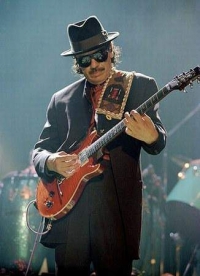
Santana is a flexible number of musicians accompanying Carlos Santana since the late 1960s. Just like Santana himself, the band is known for helping make Latin rock famous in the rest of the world.
The band was formed in 1966 in San Francisco. The first members were Carlos Santana (lead guitar), Tom Frazier (guitar), Mike Carabello (percussion), Rod Harper (drums), Gus Rodriguez (bass) and Gregg Rolie (keyboard, vocal). In the following years the members of the group changed frequently for a number of reasons, and from 1971 to 1972 there was a brief separation between the group and Santana.
Santana himself rarely sings in his songs despite being the leader of the band and recent hits have been frequently accompanied by a guest singer, rather than the members of the band.
In 1998, the group was inducted into the Rock & Roll Hall of Fame, with Carlos Santana, Jose Chepito Areas, David Brown, Mike Carabello, Gregg Rolie and Michael Shrieve being honored.
The band was formed in 1966 in San Francisco. The first members were Carlos Santana (lead guitar), Tom Frazier (guitar), Mike Carabello (percussion), Rod Harper (drums), Gus Rodriguez (bass) and Gregg Rolie (keyboard, vocal). In the following years the members of the group changed frequently for a number of reasons, and from 1971 to 1972 there was a brief separation between the group and Santana.
Santana himself rarely sings in his songs despite being the leader of the band and recent hits have been frequently accompanied by a guest singer, rather than the members of the band.
In 1998, the group was inducted into the Rock & Roll Hall of Fame, with Carlos Santana, Jose Chepito Areas, David Brown, Mike Carabello, Gregg Rolie and Michael Shrieve being honored.
X Japan
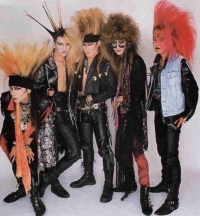
X Japan is a Japanese band founded in 1982 by Toshimitsu "Toshi" Deyama and Yoshiki Hayashi. Originally named X, the group achieved its breakthrough success in 1989 with the release of their second album Blue Blood. They started out as a power/speed metal band and later gravitated towards a progressive sound, at all times retaining an emphasis on ballads. After three more albums, X Japan disbanded in 1997.
Besides being one of the first Japanese acts to achieve mainstream success while on an independent label, the group is widely credited for pioneering the visual kei movement, though most of the group's members toned down their on-stage attire in later years. They were formerly known for their excessively large hairstyles resembling fountains. As of 2007, the band has sold over twenty million records and over two million home videos.
On 4 June 2007 it was announced the band would reunite with a new song released via digital download in January 2008 and live performances scheduled for March and May.
Besides being one of the first Japanese acts to achieve mainstream success while on an independent label, the group is widely credited for pioneering the visual kei movement, though most of the group's members toned down their on-stage attire in later years. They were formerly known for their excessively large hairstyles resembling fountains. As of 2007, the band has sold over twenty million records and over two million home videos.
On 4 June 2007 it was announced the band would reunite with a new song released via digital download in January 2008 and live performances scheduled for March and May.
Monteverdi

Claudio Giovanni Antonio Monteverdi (May 15, 1567 (baptized) â November 29, 1643), was an Italian composer, gambist, and singer.
Monteverdi's work, often regarded as revolutionary, marked the transition from the music of the Renaissance to that of the Baroque. Enjoying fame in his lifetime, he wrote one of the earliest operas, L'Orfeo, which is still regularly performed.
Monteverdi composed at least eighteen operas, but only L'Orfeo, L'incoronazione di Poppea, Il ritorno d'Ulisse in patria and the famous aria, Lamento, from his second opera L'Arianna have survived. From monody (with melodic lines, intelligible text and placid accompanying music), it was a logical step for Monteverdi to begin composing opera, especially for a dramatically inclined composer who loved grand effect. In 1607, the premiere of his first opera, L'Orfeo, took place in Mantua. It was normal at that time for composers to create works on demand for special occasions, and this piece was part of the ducal celebrations of carnival. (Monteverdi was later to write for the first opera houses supported by ticket sales which opened in Venice). L'Orfeo has dramatic power and lively orchestration and is arguably the first example of a composer assigning specific instruments to parts in operas. It is also one of the first large compositions in which the exact instrumentation of the premiere has come down to us.
Monteverdi's work, often regarded as revolutionary, marked the transition from the music of the Renaissance to that of the Baroque. Enjoying fame in his lifetime, he wrote one of the earliest operas, L'Orfeo, which is still regularly performed.
Monteverdi composed at least eighteen operas, but only L'Orfeo, L'incoronazione di Poppea, Il ritorno d'Ulisse in patria and the famous aria, Lamento, from his second opera L'Arianna have survived. From monody (with melodic lines, intelligible text and placid accompanying music), it was a logical step for Monteverdi to begin composing opera, especially for a dramatically inclined composer who loved grand effect. In 1607, the premiere of his first opera, L'Orfeo, took place in Mantua. It was normal at that time for composers to create works on demand for special occasions, and this piece was part of the ducal celebrations of carnival. (Monteverdi was later to write for the first opera houses supported by ticket sales which opened in Venice). L'Orfeo has dramatic power and lively orchestration and is arguably the first example of a composer assigning specific instruments to parts in operas. It is also one of the first large compositions in which the exact instrumentation of the premiere has come down to us.
Ennio Morricone
Ennio Morricone, OMRI (born November 10, 1928), is an Italian composer and conductor. He has composed and arranged scores for more than 500 film and television productions. Morricone is considered as one of the most influential film composers since the late 1950s. He is well-known for his long-term collaborations with international acclaimed directors such as Sergio Leone, Brian De Palma, Barry Levinson, and Giuseppe Tornatore.
He wrote the characteristic film scores of Leone's Spaghetti Westerns A Fistful of Dollars (1964), For a Few Dollars More (1965), The Good, the Bad and the Ugly (1966), Once Upon a Time in the West (1968), The Great Silence (1968), and My Name Is Nobody (1973). In the 80s, Morricone composed the scores for John Carpenter's horror movie The Thing (1982), Leone's Once Upon a Time in America (1984), Roland Joffé's The Mission (1986), Brian De Palma's The Untouchables (1987) and Giuseppe Tornatore's Cinema Paradiso (1988).
His more recent compositions include the scores for Oliver Stone's U Turn (1997), Tornatore's The Legend of 1900 (1998) and Malèna (2000), Mission to Mars (2000) by Brian De Palma, Fateless (2005), and Baaria - La porta del vento (2009). Ennio Morricone has won two Grammy Awards, two Golden Globes and five Anthony Asquith Awards for Film Music by BAFTA in 1979–1992. He has been nominated for five Academy Awards for Best Music, Original Score in 1979–2001. Morricone received the Honorary Academy Award in 2007 "for his magnificent and multifaceted contributions to the art of film music". He was the second composer to receive this award after its introduction in 1928.
He wrote the characteristic film scores of Leone's Spaghetti Westerns A Fistful of Dollars (1964), For a Few Dollars More (1965), The Good, the Bad and the Ugly (1966), Once Upon a Time in the West (1968), The Great Silence (1968), and My Name Is Nobody (1973). In the 80s, Morricone composed the scores for John Carpenter's horror movie The Thing (1982), Leone's Once Upon a Time in America (1984), Roland Joffé's The Mission (1986), Brian De Palma's The Untouchables (1987) and Giuseppe Tornatore's Cinema Paradiso (1988).
His more recent compositions include the scores for Oliver Stone's U Turn (1997), Tornatore's The Legend of 1900 (1998) and Malèna (2000), Mission to Mars (2000) by Brian De Palma, Fateless (2005), and Baaria - La porta del vento (2009). Ennio Morricone has won two Grammy Awards, two Golden Globes and five Anthony Asquith Awards for Film Music by BAFTA in 1979–1992. He has been nominated for five Academy Awards for Best Music, Original Score in 1979–2001. Morricone received the Honorary Academy Award in 2007 "for his magnificent and multifaceted contributions to the art of film music". He was the second composer to receive this award after its introduction in 1928.
Edvard Grieg

Edvard Hagerup Grieg (15 June 1843 – 4 September 1907) was a Norwegian composer and pianist who composed in the Romantic period. He is best known for his Piano Concerto in A minor, for his incidental music to Henrik Ibsen's play Peer Gynt (which includes Morning Mood and In the Hall of the Mountain King), and for his collection of piano miniatures Lyric Pieces. "Edvard" is sometimes mispelt as "Edward".
Grieg is renowned as a nationalist composer, drawing inspiration from Norwegian folk music. Early works include a symphony (which he later suppressed) and a piano sonata. He also wrote three sonatas for violin and piano and a cello sonata. His many short pieces for piano — often based on Norwegian folk tunes and dances — led some to call him the "Chopin of the North".
Concerto in A minor: 1. Allegro molto moderato
Performed by the University of Washington Symphony, conducted by Peter Erős (Neal O'Doan, piano)
Concerto in A minor: 1. Allegro molto moderato
Performed by the Skidmore College Orchestra (courtesy of Musopen)
Concerto in A minor: 2. Adagio
Performed by the University of Washington Symphony, conducted by Peter Erős (Neal O'Doan, piano)
Concerto in A minor: 2. Adagio
Performed by the Skidmore College Orchestra (courtesy of Musopen)
Concerto in A minor: 3. Allegro moderato molto e marcato
Performed by the University of Washington Symphony, conducted by Peter Erős (Neal O'Doan, piano)
Concerto in A minor: 3. Allegro moderato molto e marcato
Performed by the Skidmore College Orchestra (courtesy of Musopen)
Notturno, Op. 54, No. 4
Performed live by Mark Gasser
Problems listening to these files? See media help.
The Piano Concerto is his most popular work. Its champions have included the pianist and composer Percy Grainger, a personal friend of Grieg who played the concerto frequently during his long career. An arrangement of part of the work made an iconic television comedy appearance in the 1971 Morecambe and Wise Show, conducted by André Previn.
Some of the Lyric Pieces (for piano) are also well-known, as is the incidental music to Henrik Ibsen's play Peer Gynt, a play that Grieg found to be an arduous work to score properly. In a 1874 letter to his friend Frants Beyer, Grieg expressed his unhappiness with what is now considered one of his most popular compositions from Peer Gynt, In the Hall of the Mountain King: "I have also written something for the scene in the hall of the mountain King - something that I literally can't bear listening to because it absolutely reeks of cow-pies, exaggerated Norwegian nationalism, and trollish self-satisfaction! But I have a hunch that the irony will be discernible."
Grieg is renowned as a nationalist composer, drawing inspiration from Norwegian folk music. Early works include a symphony (which he later suppressed) and a piano sonata. He also wrote three sonatas for violin and piano and a cello sonata. His many short pieces for piano — often based on Norwegian folk tunes and dances — led some to call him the "Chopin of the North".
Concerto in A minor: 1. Allegro molto moderato
Performed by the University of Washington Symphony, conducted by Peter Erős (Neal O'Doan, piano)
Concerto in A minor: 1. Allegro molto moderato
Performed by the Skidmore College Orchestra (courtesy of Musopen)
Concerto in A minor: 2. Adagio
Performed by the University of Washington Symphony, conducted by Peter Erős (Neal O'Doan, piano)
Concerto in A minor: 2. Adagio
Performed by the Skidmore College Orchestra (courtesy of Musopen)
Concerto in A minor: 3. Allegro moderato molto e marcato
Performed by the University of Washington Symphony, conducted by Peter Erős (Neal O'Doan, piano)
Concerto in A minor: 3. Allegro moderato molto e marcato
Performed by the Skidmore College Orchestra (courtesy of Musopen)
Notturno, Op. 54, No. 4
Performed live by Mark Gasser
Problems listening to these files? See media help.
The Piano Concerto is his most popular work. Its champions have included the pianist and composer Percy Grainger, a personal friend of Grieg who played the concerto frequently during his long career. An arrangement of part of the work made an iconic television comedy appearance in the 1971 Morecambe and Wise Show, conducted by André Previn.
Some of the Lyric Pieces (for piano) are also well-known, as is the incidental music to Henrik Ibsen's play Peer Gynt, a play that Grieg found to be an arduous work to score properly. In a 1874 letter to his friend Frants Beyer, Grieg expressed his unhappiness with what is now considered one of his most popular compositions from Peer Gynt, In the Hall of the Mountain King: "I have also written something for the scene in the hall of the mountain King - something that I literally can't bear listening to because it absolutely reeks of cow-pies, exaggerated Norwegian nationalism, and trollish self-satisfaction! But I have a hunch that the irony will be discernible."
George Coles Stebbins
George Coles Stebbins was a gospel song writer. Stebbins was born February 26, 1846, in Orleans County, New York, where he spent the first 23 years of his life on a farm. In 1869 he moved to Chicago, Illinois, which marked the beginning of his musical career.
Dorian Le Gallienne
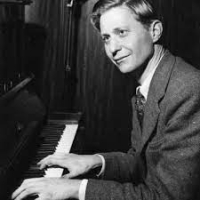
Dorian Leon Marlois Le Gallienne (19 April 1915 – 27 July 1963) was an Australian composer, teacher and music critic.
Dorian Le Gallienne was born in Melbourne in 1915. His father, an actor, was born in France, and his mother, a pianist who had studied with G. W. L. Marshall-Hall, was the daughter of the Assistant Astronomer at the Melbourne Observatory. His parents separated in 1924, and his father lived in England thereafter. He attended Melbourne Church of England Grammar School. He was diagnosed with diabetes at age 16. After leaving school, he studied with A. E. H. Nickson at the Melbourne Conservatorium and with Arthur Benjamin and Herbert Howells at the Royal College of Music in London in 1938. In 1939, he travelled in Europe with Richard Downing, a future Chairman of the Australian Broadcasting Commission (ABC), and with whom he later lived in Melbourne in a mud-brick house at Eltham.
Dorian Le Gallienne was born in Melbourne in 1915. His father, an actor, was born in France, and his mother, a pianist who had studied with G. W. L. Marshall-Hall, was the daughter of the Assistant Astronomer at the Melbourne Observatory. His parents separated in 1924, and his father lived in England thereafter. He attended Melbourne Church of England Grammar School. He was diagnosed with diabetes at age 16. After leaving school, he studied with A. E. H. Nickson at the Melbourne Conservatorium and with Arthur Benjamin and Herbert Howells at the Royal College of Music in London in 1938. In 1939, he travelled in Europe with Richard Downing, a future Chairman of the Australian Broadcasting Commission (ABC), and with whom he later lived in Melbourne in a mud-brick house at Eltham.
Yasunori Mitsuda
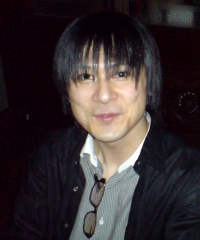
Yasunori Mitsuda (光田 康典 Mitsuda Yasunori?, born January 21, 1972) is a Japanese video game composer, sound programmer, and musician. He has composed music for or worked on over 35 games, and has contributed to over 15 other albums. He is best known for his compositions for the video games Chrono Trigger, Chrono Cross, Shadow Hearts, Shadow Hearts: Covenant, Xenogears, Xenosaga Episode I, and Mario Party. He began composing video game music for his own games in high school, and after graduation attended Junior College of Music in Tokyo. In 1992 upon graduation he joined Square (now Square Enix) as a composer after seeing a magazine advertisement in an office he was visiting with his professor.
Despite his job title as a composer, Mitsuda worked for two years as a sound engineer. In 1994, after threatening to quit to Square's vice president, Hironobu Sakaguchi, he was assigned to compose the soundtrack to Chrono Trigger. After the game's success and the music's acclaim, he went on to compose several other games for Square, including Xenogears. In 1998 Mitsuda left Square to work as a freelance composer, founding his own music production studio, Procyon Studio, in 2001 as well as his own record label, Sleigh Bells. The company has since expanded to nine employees, and Mitsuda continues to compose for video games, as well as for anime series and his own independent albums.
Despite his job title as a composer, Mitsuda worked for two years as a sound engineer. In 1994, after threatening to quit to Square's vice president, Hironobu Sakaguchi, he was assigned to compose the soundtrack to Chrono Trigger. After the game's success and the music's acclaim, he went on to compose several other games for Square, including Xenogears. In 1998 Mitsuda left Square to work as a freelance composer, founding his own music production studio, Procyon Studio, in 2001 as well as his own record label, Sleigh Bells. The company has since expanded to nine employees, and Mitsuda continues to compose for video games, as well as for anime series and his own independent albums.
Finding Neverland
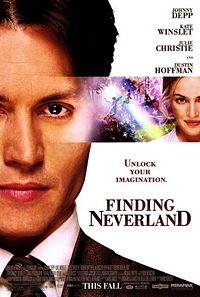
Finding Neverland is a 2004 British/American semi-biographical film directed by Marc Forster. The screenplay by David Magee is based on the play The Man Who Was Peter Pan by Allan Knee.
The Last 5 Years
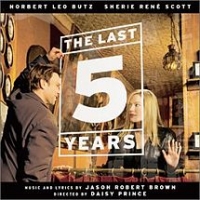
The Last Five Years is a one-act musical written by Jason Robert Brown. It premiered in Chicago in 2001 and was then produced off-Broadway in March 2002. Since then it has had numerous productions both in the United States and internationally.
Koji Kondo

Koji Kondo (近藤浩治 Kondō Kōji?, born August 13, 1960) is a Japanese video game composer and sound director who has been employed at Nintendo since 1984. He is best known for scoring numerous titles in the Mario and The Legend of Zelda series.
Hermann Kotzschmar
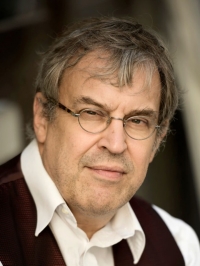
Hermann Kretzschmar studied music education and German literature and subsequently piano with Bernhard Ebert in Hanover. He became a member of the Ensemble Modern in 1985, where he works as a soloist and chamber musician. In 1994 he founded HCD Productions together with Catherine Milliken and Dietmar Wiesner.
Dominik Feri

Dominik Feri (born 11 July 1996) is a Czech former politician who was a Member of the Chamber of Deputies from 2017 to 2021. Elected at the age of 21, he is the youngest and the first black member of the Chamber of Deputes in the history of the Czech Republic.Feri plays accordion and piano. He stated that his opinions are close to those of the Czech Pirate Party.
Paulo Tirol
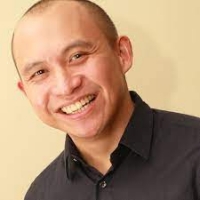
PAULO K TIRÓL. Composer, Lyricist, Bookwriter, Arranger ... Paulo is one of 21 writers featured in Prospect Theater Co.'s NOTES FROM NOW, a new show which ...
Victor Lebedev
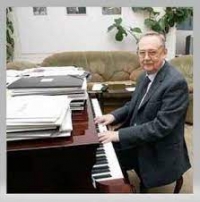
Victor Mikhailovich Lebedev (5 January 1935 – 11 March 2021) was a Russian composer (Heavenly Swallows, Be My Husband, Gardes-Marines, Ahead!). He was born in Leningrad, USSR. He was awarded the title of People's Artist of Russia in 2005.In 1968, he composed an opera of Aleksandr Volkov's The Wizard of the Emerald City, a Russian retelling of L. Frank Baum's The Wonderful Wizard of Oz, on a libretto by William Roshchin and Vladimir Uflyand.
The Glassbox
Punk, Avant-Garde and Minimal, non-stereotypes. Michael Chalmer-Vocals, Guitar, Saxophone,
Borodin

Alexander Porfiryevich Borodin (12 November 1833 – 27 February 1887) was a Russian Romantic composer and chemist of Georgian–Russian parentage. He was a member of the group of composers called The Five (or "The Mighty Handful"), who were dedicated to producing a specifically Russian kind of art music. He is best known for his symphonies, his two string quartets, and his opera Prince Igor. Music from Prince Igor and his string quartets was later adapted for the musical Kismet.
Emily Haines

Emily Savitri Haines is a Canadian singer and songwriter. She is the lead singer, keyboardist and songwriter of the rock band Metric and a member of Broken Social Scene. As a solo artist, she has performed under her own name and under the moniker Emily Haines & The Soft Skeleton.
Jack Glogau
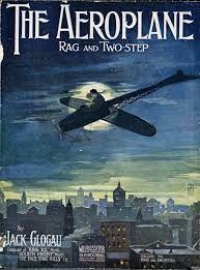
He was a composer and songwriter, presumably American, of popular music and for much of his output he teamed up with Al Piantadosi. Of ragtime interest is his The Aeroplane (1913) described below. His works include marches, a foxtrot The Carus Breeze (1914) , patriotic WW1 songs as well as other songs, some comic. He is perhaps best known for his On the Shores of Italy (1914) written together with Al Piantadosi.
Groove Riders

Groove Riders is a disco-funk artist. caused by the merger of four male members, Burin Boonvisut, Nataphol Srichomkwan (Kor), Adisak Hattakulkowit (Kung) and Matachai Makrutthong (Matt), with the leader There are popular songs like Love that just passed, don't drive drunk, hormones, just you and stop.
Bach

Johann Sebastian Bach (31 March 1685 – 28 July 1750) was a German composer and organist whose sacred and secular works for choir, orchestra, and solo instruments drew together the strands of the Baroque period and brought it to its ultimate maturity. Although he introduced no new forms, he enriched the prevailing German style with a robust contrapuntal technique, an unrivalled control of harmonic and motivic organisation in composition for diverse musical forces, and the adaptation of rhythms and textures from abroad, particularly Italy and France.
Revered for their intellectual depth and technical and artistic beauty, Bach's works include the Brandenburg concertos; the Goldberg Variations; the English Suites, French Suites, Partitas, and Well-Tempered Clavier; the Mass in B Minor; the St. Matthew Passion; the St. John Passion; The Musical Offering; The Art of Fugue; the Sonatas and Partitas for violin solo; the Cello Suites; more than 200 surviving cantatas; and a similar number of organ works, including the celebrated Toccata and Fugue in D Minor.
While Bach's fame as an organist was great during his lifetime, he was not particularly well-known as a composer. His adherence to Baroque forms and contrapuntal style was considered "old-fashioned" by his contemporaries, especially late in his career when the musical fashion tended towards Rococo and later Classical styles. A revival of interest and performances of his music began early in the 19th century, and he is now widely considered to be one of the greatest composers in the Western tradition.
Revered for their intellectual depth and technical and artistic beauty, Bach's works include the Brandenburg concertos; the Goldberg Variations; the English Suites, French Suites, Partitas, and Well-Tempered Clavier; the Mass in B Minor; the St. Matthew Passion; the St. John Passion; The Musical Offering; The Art of Fugue; the Sonatas and Partitas for violin solo; the Cello Suites; more than 200 surviving cantatas; and a similar number of organ works, including the celebrated Toccata and Fugue in D Minor.
While Bach's fame as an organist was great during his lifetime, he was not particularly well-known as a composer. His adherence to Baroque forms and contrapuntal style was considered "old-fashioned" by his contemporaries, especially late in his career when the musical fashion tended towards Rococo and later Classical styles. A revival of interest and performances of his music began early in the 19th century, and he is now widely considered to be one of the greatest composers in the Western tradition.
J. S. Bach
Johann Sebastian Bach (21 March 1685, O.S.31 March 1685, N.S. – 28 July 1750, N.S.) was a German composer, organist, harpsichordist, violist, and violinist whose sacred and secular works for choir, orchestra, and solo instruments drew together the strands of the Baroque period and brought it to its ultimate maturity. Although he did not introduce new forms, he enriched the prevailing German style with a robust contrapuntal technique, an unrivalled control of harmonic and motivic organisation, and the adaptation of rhythms, forms and textures from abroad, particularly from Italy and France.
Revered for their intellectual depth, technical command and artistic beauty, Bach's works include the Brandenburg Concertos, the Goldberg Variations, the Partitas, The Well-Tempered Clavier, the Mass in B minor, the St Matthew Passion, the St John Passion, the Magnificat, A Musical Offering, The Art of Fugue, the English and French Suites, the Sonatas and Partitas for solo violin, the Cello Suites, more than 200 surviving cantatas, and a similar number of organ works, including the famous Toccata and Fugue in D minor and Passacaglia and Fugue in C minor, as well as the Great Eighteen Chorale Preludes and Organ Mass.
Bach's abilities as an organist were highly respected throughout Europe during his lifetime, although he was not widely recognised as a great composer until a revival of interest and performances of his music in the first half of the 19th century. He is now generally regarded as one of the main composers of the Baroque style, and as one of the greatest composers of all time.
Revered for their intellectual depth, technical command and artistic beauty, Bach's works include the Brandenburg Concertos, the Goldberg Variations, the Partitas, The Well-Tempered Clavier, the Mass in B minor, the St Matthew Passion, the St John Passion, the Magnificat, A Musical Offering, The Art of Fugue, the English and French Suites, the Sonatas and Partitas for solo violin, the Cello Suites, more than 200 surviving cantatas, and a similar number of organ works, including the famous Toccata and Fugue in D minor and Passacaglia and Fugue in C minor, as well as the Great Eighteen Chorale Preludes and Organ Mass.
Bach's abilities as an organist were highly respected throughout Europe during his lifetime, although he was not widely recognised as a great composer until a revival of interest and performances of his music in the first half of the 19th century. He is now generally regarded as one of the main composers of the Baroque style, and as one of the greatest composers of all time.
James Huey
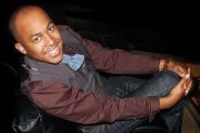
Born and raised in Phoenix, Arizona, James Huey grew up involved in church and in music ministry. He began playing music at the age of twelve and began writing his own songs by the age of thirteen. While still in his teens, James wrote the highly acclaimed praise and worship song “When I Think About The Lord.”
After high school, James went on to study at Christ For The Nations Institute in Dallas, Texas. In his freshman year at Christ For The Nations Institute, James led a gospel choir of over 50 strong. It is there that he taught the choir his song, “When I Think About The Lord,” and soon after, CFNI produced the “Make Me Shout” album featuring the song. It is now widely recognized as oneof the modern classics in praise and worship music and is sung in churches throughout the world.
After high school, James went on to study at Christ For The Nations Institute in Dallas, Texas. In his freshman year at Christ For The Nations Institute, James led a gospel choir of over 50 strong. It is there that he taught the choir his song, “When I Think About The Lord,” and soon after, CFNI produced the “Make Me Shout” album featuring the song. It is now widely recognized as oneof the modern classics in praise and worship music and is sung in churches throughout the world.
Adolphe Adam
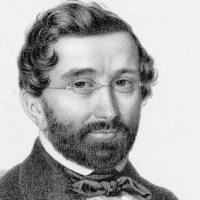
Adolphe Charles Adam (French: ; 24 July 1803 – 3 May 1856) was a French composer and music critic. A prolific composer of operas and ballets, he is best known today for his ballets Giselle (1841) and Le corsaire (1856, his last work), his operas Le postillon de Lonjumeau (1836), Le toréador (1849) and Si j'étais roi (1852) and his Christmas carol Minuit, chrétiens! (1844), later set to different English lyrics and widely sung as "O Holy Night" (1847). Adam was a noted teacher, who taught Delibes and other influential composers.
Giovanni Allevi

Giovanni Allevi (; born in Ascoli Piceno, April 9, 1969) is an Italian pianist and composerAllevi attained a "first-class diploma" both in piano at the "F. Morlacchi" conservatoire in Perugia and in composition at the "G. Verdi" academy of music in Milan. He graduated cum laude in Philosophy with a thesis entitled "Il vuoto nella Fisica contemporanea" (The Void in Contemporary Physics) and he attended the Accademia Internazionale di Alto Perfezionamento in Arezzo, under maestro Carlo Alberto Neri.
Thomas Seinen
Thomas Seinen musician, classical composer and arranger, known for writing new interpretations of many old classical pieces.
Alicia Keys

Alicia J. Augello-Cook (born January 25, 1981), and has won numerous awards, including eleven Grammy Awards, seventeen Billboard Music Awards, three American Music Awards.
Her debut album Songs in A Minor was a worldwide success, selling nearly 11 millions albums, and received five Grammy Awards in 2002, with Alicia winning Best New Artist and also Song of the Year for "Fallin'".
Her debut album Songs in A Minor was a worldwide success, selling nearly 11 millions albums, and received five Grammy Awards in 2002, with Alicia winning Best New Artist and also Song of the Year for "Fallin'".
Beethoven

Ludwig van Beethoven (16 December 1770 - 26 March 1827) was a German composer and pianist. He was a crucial figure in the transitional period between the Classical and Romantic eras in Western classical music, and remains one of the most respected and influential composers of all time.
Born in Bonn, then in the Electorate of Cologne (now in modern-day Germany), he moved to Vienna in his early twenties and settled there, studying with Joseph Haydn and quickly gaining a reputation as a virtuoso pianist. Beethoven's hearing gradually deteriorated beginning in his twenties, yet he continued to compose masterpieces, and to conduct and perform, even after he was completely deaf.
Born in Bonn, then in the Electorate of Cologne (now in modern-day Germany), he moved to Vienna in his early twenties and settled there, studying with Joseph Haydn and quickly gaining a reputation as a virtuoso pianist. Beethoven's hearing gradually deteriorated beginning in his twenties, yet he continued to compose masterpieces, and to conduct and perform, even after he was completely deaf.
Taeyang

Dong Young-Bae (Korean: 동영배, Hanja: 東永裴, born May 18, 1988), better known by his stage name Taeyang or SOL, is the main vocalist in Big Bang. Like the other members, Taeyang is signed with management company YG Entertainment. He began training under YG Entertainment at the age of twelve alongside fellow member and leader G-Dragon. After six years of vocal and dance training he made his debut in 2006 as part of Big Bang.
Tommy Flanagan
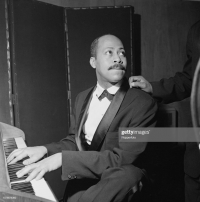
Thomas Lee Flanagan was an American jazz pianist and composer. He grew up in Detroit, initially influenced by such pianists as Art Tatum, Teddy Wilson, and Nat King Cole, and then by the newer bebop musicians.
Mozart

Wolfgang Amadeus Mozart, full name Johann Chrysostom Wolfgang Amadeus Mozart (27 January 1756 â 5 December 1791) was a prolific and influential composer of the Classical era. His over 600 compositions include works widely acknowledged as pinnacles of symphonic, concertante, chamber, piano, operatic, and choral music. Mozart is among the most enduringly popular of classical composers, and many of his works are part of the standard concert repertoire.
Mozart's music, like Haydn's, stands as an archetypal example of the Classical style. His works spanned the period during which that style transformed from one exemplified by the style galant to one that began to incorporate some of the contrapuntal complexities of the late Baroque, complexities against which the galant style had been a reaction. Mozart's own stylistic development closely paralleled the development of the classical style as a whole. In addition, he was a versatile composer and wrote in almost every major genre, including symphony, opera, the solo concerto, chamber music including string quartet and string quintet, and the piano sonata. While none of these genres were new, the piano concerto was almost single-handedly developed and popularized by Mozart. He also wrote a great deal of religious music, including masses; and he composed many dances, divertimenti, serenades, and other forms of light entertainment.
The central traits of the classical style can be identified in Mozart's music. Clarity, balance, and transparency are hallmarks of his work.
Mozart's music, like Haydn's, stands as an archetypal example of the Classical style. His works spanned the period during which that style transformed from one exemplified by the style galant to one that began to incorporate some of the contrapuntal complexities of the late Baroque, complexities against which the galant style had been a reaction. Mozart's own stylistic development closely paralleled the development of the classical style as a whole. In addition, he was a versatile composer and wrote in almost every major genre, including symphony, opera, the solo concerto, chamber music including string quartet and string quintet, and the piano sonata. While none of these genres were new, the piano concerto was almost single-handedly developed and popularized by Mozart. He also wrote a great deal of religious music, including masses; and he composed many dances, divertimenti, serenades, and other forms of light entertainment.
The central traits of the classical style can be identified in Mozart's music. Clarity, balance, and transparency are hallmarks of his work.
Chopin

Frédéric Chopin (1 March 1810 – 17 October 1849) was a Polish composer and virtuoso pianist of the Romantic period. He is widely regarded as the greatest Polish composer, and ranks as one of music's greatest tone poets.
He was born in the village of Żelazowa Wola, in the Duchy of Warsaw, to a Polish mother and French-expatriate father, and in his early life was regarded as a child-prodigy pianist. In November 1830, at the age of 20, Chopin went abroad; following the suppression of the Polish November Uprising of 1830–31, he became one of many expatriates of the Polish "Great Emigration."
In Paris, he made a comfortable living as a composer and piano teacher, while giving few public performances. A Polish patriot,
Chopin's extant compositions were written primarily for the piano as a solo instrument. Though technically demanding, Chopin's style emphasizes nuance and expressive depth rather than virtuosity. Chopin invented musical forms such as the ballade and was responsible for major innovations in forms such as the piano sonata, waltz, nocturne, étude, impromptu and prelude. His works are mainstays of Romanticism in 19th-century classical music.
He was born in the village of Żelazowa Wola, in the Duchy of Warsaw, to a Polish mother and French-expatriate father, and in his early life was regarded as a child-prodigy pianist. In November 1830, at the age of 20, Chopin went abroad; following the suppression of the Polish November Uprising of 1830–31, he became one of many expatriates of the Polish "Great Emigration."
In Paris, he made a comfortable living as a composer and piano teacher, while giving few public performances. A Polish patriot,
Chopin's extant compositions were written primarily for the piano as a solo instrument. Though technically demanding, Chopin's style emphasizes nuance and expressive depth rather than virtuosity. Chopin invented musical forms such as the ballade and was responsible for major innovations in forms such as the piano sonata, waltz, nocturne, étude, impromptu and prelude. His works are mainstays of Romanticism in 19th-century classical music.
Samuel Barber

Samuel Osborne Barber II (March 9, 1910 – January 23, 1981) was an American composer of orchestral, opera, choral, and piano music. He is one of the most celebrated composers of the 20th century: music critic Donal Henahan stated that "Probably no other American composer has ever enjoyed such early, such persistent and such long-lasting acclaim."
His Adagio for Strings (1936) has earned a permanent place in the concert repertory of orchestras. He was awarded the Pulitzer Prize for Music twice: for his opera Vanessa (1956–57) and for the Concerto for Piano and Orchestra (1962). Also widely performed is his Knoxville: Summer of 1915 (1947), a setting for soprano and orchestra of a prose text by James Agee. At the time of his death, nearly all of his compositions had been recorded.
His Adagio for Strings (1936) has earned a permanent place in the concert repertory of orchestras. He was awarded the Pulitzer Prize for Music twice: for his opera Vanessa (1956–57) and for the Concerto for Piano and Orchestra (1962). Also widely performed is his Knoxville: Summer of 1915 (1947), a setting for soprano and orchestra of a prose text by James Agee. At the time of his death, nearly all of his compositions had been recorded.
Damien Rice
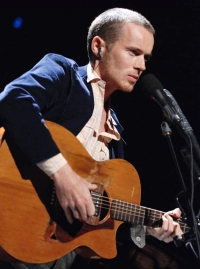
Damien Rice (born December 7, 1973) is an Irish folk singer. He was born in Dublin, Ireland, to George and Maureen Rice and was raised in Celbridge, County Kildare, Ireland. He is also a distant relative of the famous Dubliner Katharine Rice.
He has released five albums: O, B-Sides, 9, Live At Fingerprints Warts & All, and Live from the Union Chapel.
Thanks to David Arnold, his second cousin, Rice was able to record O, which was released in 2003. O was dedicated to fellow Irish musician Mic Christopher. The album was a strong commercial success and won the Shortlist Music Prize.
Three years later, following extensive promotion of O in Ireland and further commercial success worldwide, Rice released his second studio album 9 in 2006. The album was recorded in 2004 and 2005, and released on November 3 in Ireland, on November 6 in Europe and the rest of the world and lastly on November 14 in North America.
He has released five albums: O, B-Sides, 9, Live At Fingerprints Warts & All, and Live from the Union Chapel.
Thanks to David Arnold, his second cousin, Rice was able to record O, which was released in 2003. O was dedicated to fellow Irish musician Mic Christopher. The album was a strong commercial success and won the Shortlist Music Prize.
Three years later, following extensive promotion of O in Ireland and further commercial success worldwide, Rice released his second studio album 9 in 2006. The album was recorded in 2004 and 2005, and released on November 3 in Ireland, on November 6 in Europe and the rest of the world and lastly on November 14 in North America.
High School Musical
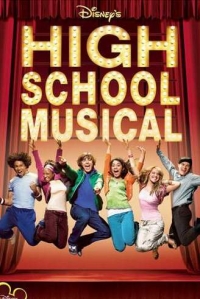
High School Musical is an Emmy Award-winning American television film. Upon its release on January 20, 2006, it became the most successful Disney Channel Original Movie (DCOM) ever produced, with a television sequel High School Musical 2 released in 2007 and the feature film High School Musical 3: Senior Year to be released theatrically in October 2008. It will be the first Disney Channel Original movie to have a theatrical sequel. A fourth installment, High School Musical 4, has been announced to be in the writing stages.
High School Musical was Disney Channel's most watched movie at its time, with 7.7 million viewers in its premiere broadcast in the US. In the UK, it received 789,000 viewers for its premiere (and 1.2 million viewers overall during the first week), making it the second most watched program for the Disney Channel (UK) of 2006. It was also the first ever Disney Channel Original Movie to be broadcast on the BBC on December 29, 2006. The film's soundtrack was the best-selling album in the United States for 2006.
With a plot described by the author and numerous critics as a modern adaptation of Romeo & Juliet, High School Musical is a story about two high school juniors from rival cliques – Troy Bolton (Zac Efron), captain of the basketball team, and Gabriella Montez (Vanessa Hudgens), a beautiful and shy transfer student who excels in math and science. Together, they try out for the lead parts in their high school musical, and as a result, divide the school. Despite other students' attempts to thwart their dreams, Troy and Gabriella resist peer pressure and rivalry, inspiring others along the way not to "stick with the status quo."
High School Musical was filmed at East High School located in Salt Lake City, Utah, the auditorium of Murray High School, & Downtown Salt Lake City. Murray High School was also the set of: Take Down (1978), Read It and Weep (2006), Minutemen (2008) and High School Musical: Get in the Picture (2008).
High School Musical was Disney Channel's most watched movie at its time, with 7.7 million viewers in its premiere broadcast in the US. In the UK, it received 789,000 viewers for its premiere (and 1.2 million viewers overall during the first week), making it the second most watched program for the Disney Channel (UK) of 2006. It was also the first ever Disney Channel Original Movie to be broadcast on the BBC on December 29, 2006. The film's soundtrack was the best-selling album in the United States for 2006.
With a plot described by the author and numerous critics as a modern adaptation of Romeo & Juliet, High School Musical is a story about two high school juniors from rival cliques – Troy Bolton (Zac Efron), captain of the basketball team, and Gabriella Montez (Vanessa Hudgens), a beautiful and shy transfer student who excels in math and science. Together, they try out for the lead parts in their high school musical, and as a result, divide the school. Despite other students' attempts to thwart their dreams, Troy and Gabriella resist peer pressure and rivalry, inspiring others along the way not to "stick with the status quo."
High School Musical was filmed at East High School located in Salt Lake City, Utah, the auditorium of Murray High School, & Downtown Salt Lake City. Murray High School was also the set of: Take Down (1978), Read It and Weep (2006), Minutemen (2008) and High School Musical: Get in the Picture (2008).
Sally DeFord

Sally DeFord Musical artist Born: 1959 (age 60 years), Eugene, Oregon, United States
Record labels: Defordmusic, Defordmusic.com, Sally DeFord Music, Sally DeFord
Genres: Alt Contemporary Christian, Christian/Gospel
Albums: He Is My Song, MORE
Record labels: Defordmusic, Defordmusic.com, Sally DeFord Music, Sally DeFord
Genres: Alt Contemporary Christian, Christian/Gospel
Albums: He Is My Song, MORE
Scarlet Pimpernel
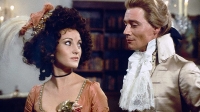
The Scarlet Pimpernel is a musical with music by Frank Wildhorn and lyrics and book by Nan Knighton, based on the 1905 novel of the same name by Baroness Orczy. The show is set in England and France during the Reign of Terror of the French Revolution.
Elvis Presley

Elvis Aaron Presley (January 8, 1935–August 16, 1977, middle name sometimes written Aron)a was an American singer, musician and actor. A cultural icon, he is commonly referred to as the "The King of Rock 'n' Roll" or "The King".
In 1954, Presley began his career as the first performer of rockabilly, an uptempo fusion of country and rhythm and blues with a strong back beat. His novel versions of existing songs, mixing "black" and "white" sounds, made him popular—and controversial—as did his uninhibited stage and television performances. He recorded songs in the rock and roll genre, with tracks like "Hound Dog" and "Jailhouse Rock" later embodying the style. Presley had a versatile voice and had unusually wide success encompassing other genres, including gospel, blues, ballads and pop. To date, he has been inducted into four music halls of fame.
In the 1960s, Presley made the majority of his thirty-one movies—mainly poorly reviewed, but financially successful, musicals. In 1968, he returned with acclaim to live music in a television special, and thereafter performed across the U.S., notably in Las Vegas. Throughout his career, he set records for concert attendance, television ratings and recordings sales. He is one of the best-selling and most influential artists in the history of popular music. Health problems, drug dependency and other factors led to his premature death at age 42.
In 1954, Presley began his career as the first performer of rockabilly, an uptempo fusion of country and rhythm and blues with a strong back beat. His novel versions of existing songs, mixing "black" and "white" sounds, made him popular—and controversial—as did his uninhibited stage and television performances. He recorded songs in the rock and roll genre, with tracks like "Hound Dog" and "Jailhouse Rock" later embodying the style. Presley had a versatile voice and had unusually wide success encompassing other genres, including gospel, blues, ballads and pop. To date, he has been inducted into four music halls of fame.
In the 1960s, Presley made the majority of his thirty-one movies—mainly poorly reviewed, but financially successful, musicals. In 1968, he returned with acclaim to live music in a television special, and thereafter performed across the U.S., notably in Las Vegas. Throughout his career, he set records for concert attendance, television ratings and recordings sales. He is one of the best-selling and most influential artists in the history of popular music. Health problems, drug dependency and other factors led to his premature death at age 42.
Barbra Streisand
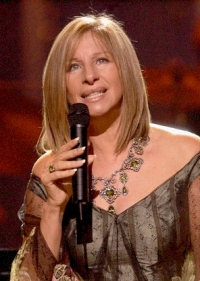
Barbra Streisand (born April 24, 1942) is an American singer, film and theatre actress. She has also achieved some note as a composer, political activist, film producer and director. She has won Academy Awards for Best Actress and Best Original Song as well as multiple Emmy Awards, Grammy Awards, and Golden Globe Awards.
She is one of the most commercially and critically successful female entertainers in modern entertainment history and one of the best selling solo recording artists in the US, with RIAA-certified shipments of over 71 million albums. She is the highest ranking female artist on the Recording Industry Association of America's (RIAA) Top Selling Artists list.
Streisand is a member of the short list of entertainers with the distinction of having won an Emmy, a Grammy, an Oscar and a Tony award.
She is one of the most commercially and critically successful female entertainers in modern entertainment history and one of the best selling solo recording artists in the US, with RIAA-certified shipments of over 71 million albums. She is the highest ranking female artist on the Recording Industry Association of America's (RIAA) Top Selling Artists list.
Streisand is a member of the short list of entertainers with the distinction of having won an Emmy, a Grammy, an Oscar and a Tony award.
Arthur Sullivan
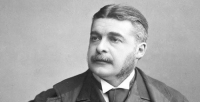
Sir Arthur Seymour Sullivan MVO was an English composer. He is best known for 14 operatic collaborations with the dramatist W. S. Gilbert, including H.M.S. Pinafore, The Pirates of Penzance and The Mikado.
Kerry Mills
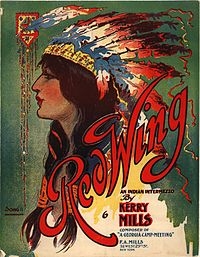
Kerry Mills (né Frederick Allen Mills; 1 February 1869 in Philadelphia – 5 December 1948 in Hawthorne, California), publishing also as F.A . Mills was an American ragtime composer and music publishing executive of popular music during the Tin Pan Alley era. His stylistically diverse music ranged from ragtime through cakewalk to marches. He was most prolific between 1895 and 1918.
Bud Powell
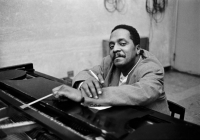
Earl Rudolph "Bud" Powell (September 27, 1924 – July 31, 1966) was an American jazz pianist. Though Thelonious Monk was a close friend and influence, his greatest piano influence was Art Tatum.
Along with Charlie Parker, Monk, and Dizzy Gillespie, Powell was a leading figure in the development of modern jazz, or bebop. His virtuosity led many to call him the Charlie Parker of the piano. Powell was also a composer, and many jazz critics credit his works and his playing as having "greatly extended the range of jazz harmony."
Along with Charlie Parker, Monk, and Dizzy Gillespie, Powell was a leading figure in the development of modern jazz, or bebop. His virtuosity led many to call him the Charlie Parker of the piano. Powell was also a composer, and many jazz critics credit his works and his playing as having "greatly extended the range of jazz harmony."
Charles-Valentin Alkan
Charles-Valentin Alkan (French: ; 30 November 1813 – 29 March 1888) was a French-Jewish composer and virtuoso pianist. At the height of his fame in the 1830s and 1840s he was, alongside his friends and colleagues Frédéric Chopin and Franz Liszt, among the leading pianists in Paris, a city in which he spent virtually his entire life.Alkan earned many awards at the Conservatoire de Paris, which he entered before he was six. His career in the salons and concert halls of Paris was marked by his occasional long withdrawals from public performance, for personal reasons. Although he had a wide circle of friends and acquaintances in the Parisian artistic world, including Eugène Delacroix and George Sand, from 1848 he began to adopt a reclusive life style, while continuing with his compositions – virtually all of which are for the keyboard.
E. Meyer Helmund
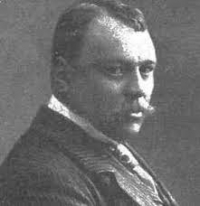
Erik Meyer-Helmund was a Berlin-based composer and singer. His song "Flirtation" was recorded by John McCormack, and his "Gute Nacht, mein holdes, süßes Mädchen" by Nicolai Gedda and Fritz Wunderlich. Helen Tretbar translated several of his lieder from German into English.
Anastacia

Anastacia (born Anastacia Lyn Newkirk; September 17, 1968) is an American singer-songwriter. Anastacia has been highly successful in Europe, Asia, South Africa and South America, but has had only minor success in her native United States. Her debut album, Not That Kind, released in 2000, achieved multi-platinum sales in Australia, New Zealand and much of Europe, was critically acclaimed by Elton John and Michael Jackson, and had the 4th biggest European single and biggest Australian single of 2000. She was awarded 'Best-selling International Artist' in 2000. Her next two albums also earned multi-platinum sales throughout Europe and Oceania making her one of the fastest and biggest-selling artists of the new millennium.
In 2005, she was recognized for worldwide sales of over 20 million albums/records. Anastacia is world-renowned for her powerful soul voice, and her small stature – 5 feet 3 inches (160 cm). She was also known for her trademark glasses (often darkly tinted), but she had surgery to correct her vision permanently in August 2005.
In 2005, she was recognized for worldwide sales of over 20 million albums/records. Anastacia is world-renowned for her powerful soul voice, and her small stature – 5 feet 3 inches (160 cm). She was also known for her trademark glasses (often darkly tinted), but she had surgery to correct her vision permanently in August 2005.
Dido
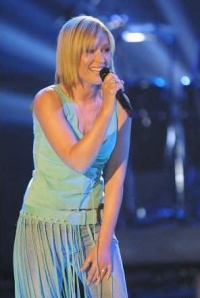
Dido Florian Cloud de Bounevialle O'Malley Armstrong (born 25 December 1971), is an English BRIT Award-winning and Grammy Award-nominated singer and songwriter.
Dido's mother, Claire (born Collins), is a French poet and her father, William O'Malley Armstrong (9 November 1938 – 22 December 2006) was an Irish publisher and former managing director of Sidgwick & Jackson.
Informally named after the mythical Carthaginian queen, Dido was educated at Thornhill Primary, City of London Girls' and Westminster School. Because she was born on Christmas Day, in childhood she celebrated, rather in the manner of the British monarch, an "official" birthday on 25 June.
After she stole a recorder from school at age five, her parents enrolled her at the Guildhall School of Music in London, England. By the time she reached her teens Dido had learned to play the piano, recorder and the violin. After her teens and whilst working as a literary agent, Dido studied law at Birkbeck, University of London, however, she never completed this course, deciding instead to take up music full-time. After learning the guitar, she showcased her skills to audiences during her 2004 Life for Rent tour.
Dido's mother, Claire (born Collins), is a French poet and her father, William O'Malley Armstrong (9 November 1938 – 22 December 2006) was an Irish publisher and former managing director of Sidgwick & Jackson.
Informally named after the mythical Carthaginian queen, Dido was educated at Thornhill Primary, City of London Girls' and Westminster School. Because she was born on Christmas Day, in childhood she celebrated, rather in the manner of the British monarch, an "official" birthday on 25 June.
After she stole a recorder from school at age five, her parents enrolled her at the Guildhall School of Music in London, England. By the time she reached her teens Dido had learned to play the piano, recorder and the violin. After her teens and whilst working as a literary agent, Dido studied law at Birkbeck, University of London, however, she never completed this course, deciding instead to take up music full-time. After learning the guitar, she showcased her skills to audiences during her 2004 Life for Rent tour.
Joe Pass
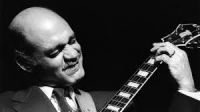
Joe Pass is a Sicilian-origin jazz guitarist. He is considered one of the greatest jazz guitarists of the 20th century. Chord melody style, knowledge of chord inversions and advances, and the use of cane and counterpoint during improvisation created opportunities for jazz guitar
Alfred Jaell
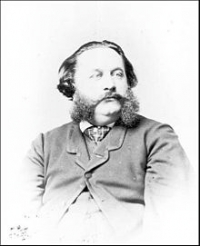
Alfred Jaëll (5 March 1832 – 27 February 1882) was an Austrian pianist.
He was born in Trieste. He studied under Carl Czernyand began his public career at the age of 11, appearing at the Teatro San Benedetto, Venice, in 1843. The following year he studied with Ignaz Moscheles in Vienna. In 1845 and 1846 he lived in Brussels, then Paris. According to one source, he was a student of Chopin, and according to another, he was a student of Liszt; however, most sources make no mention of these associations.
He was born in Trieste. He studied under Carl Czernyand began his public career at the age of 11, appearing at the Teatro San Benedetto, Venice, in 1843. The following year he studied with Ignaz Moscheles in Vienna. In 1845 and 1846 he lived in Brussels, then Paris. According to one source, he was a student of Chopin, and according to another, he was a student of Liszt; however, most sources make no mention of these associations.
Carter Burwell
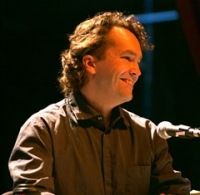
Carter Burwell (born November 18, 1955) is an American composer of film scores.
Burwell was born in New York City. He graduated from King School in Stamford, Connecticut, and Harvard College.
As a film composer, Burwell has had a long working relationship with the Coen Brothers, providing music for every film they have made (except for O Brother, Where Art Thou?, where he simply provided additional music to a score primarily composed by T Bone Burnett). He enjoys working with left-field directors and has also scored Spike Jonze's films. Among his best known film scores are And the Band Played On (1993), Conspiracy Theory (1997), Hamlet (2000), The Spanish Prisoner (1997), Before the Devil Knows You're Dead (2007), In Bruges (2008) and Twilight (2008).
Burwell, like many composers, studied piano. Starting lessons when he was 7, he studied Mozart mostly, but eventually quit.
In April 2005, Burwell composed and conducted music, performed by The Parabola Ensemble, for the plays "Sawbones" written and directed by the Coen Brothers, "Hope Leaves the Theater" written and directed by Charlie Kaufman and "Anomalisa" written and directed by Francis Fregoli. This was a segment of the sound-only production Theater of the New Ear, which debuted at St. Ann's Warehouse in Brooklyn, NY with support from Sirius Satellite Radio, United Talent Agency and Sony Pictures.
Burwell married Christine Sciulli in 1999.
Burwell was born in New York City. He graduated from King School in Stamford, Connecticut, and Harvard College.
As a film composer, Burwell has had a long working relationship with the Coen Brothers, providing music for every film they have made (except for O Brother, Where Art Thou?, where he simply provided additional music to a score primarily composed by T Bone Burnett). He enjoys working with left-field directors and has also scored Spike Jonze's films. Among his best known film scores are And the Band Played On (1993), Conspiracy Theory (1997), Hamlet (2000), The Spanish Prisoner (1997), Before the Devil Knows You're Dead (2007), In Bruges (2008) and Twilight (2008).
Burwell, like many composers, studied piano. Starting lessons when he was 7, he studied Mozart mostly, but eventually quit.
In April 2005, Burwell composed and conducted music, performed by The Parabola Ensemble, for the plays "Sawbones" written and directed by the Coen Brothers, "Hope Leaves the Theater" written and directed by Charlie Kaufman and "Anomalisa" written and directed by Francis Fregoli. This was a segment of the sound-only production Theater of the New Ear, which debuted at St. Ann's Warehouse in Brooklyn, NY with support from Sirius Satellite Radio, United Talent Agency and Sony Pictures.
Burwell married Christine Sciulli in 1999.
Charles H. Giffen

Giffen, Charles H.; music (American, born 1940) ... genre: carol|Christmas music|choral music|song ... musical score: Choral Public Domain Library, ...
The Chorus
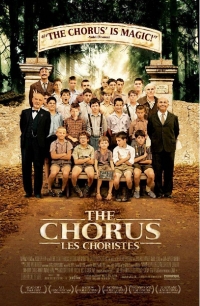
The Chorus (Les Choristes) is a 2004 French drama film directed by Christophe Barratier. Co-written by Barratier and Philippe Lopes-Curval, it is a remake of the 1945 film A Cage of Nightingales (La Cage aux Rossignols), which was adapted by Noël-Noël and René Wheeler from a story by Wheeler and Georges Chaperot.
The film explores the pain of a child's separation from his parents and the transcendence of music as the greatest form of expression.
The film explores the pain of a child's separation from his parents and the transcendence of music as the greatest form of expression.
 Sheet Music Max is a site for those who wants to access popular sheet music easily,
letting them download the sheet music for free for trial purposes.
It's completely free to download and try the listed sheet music, but you have to delete the files after 24 hours of trial.
Don't forget, if you like the piece of music you have just learned playing,
treat the artist with respect, and go buy the original sheet music.
Sheet Music Max is a site for those who wants to access popular sheet music easily,
letting them download the sheet music for free for trial purposes.
It's completely free to download and try the listed sheet music, but you have to delete the files after 24 hours of trial.
Don't forget, if you like the piece of music you have just learned playing,
treat the artist with respect, and go buy the original sheet music.
